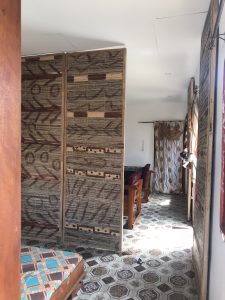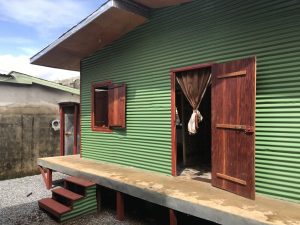How Kaloum Bankhi Builds Homes with Low-income Communities in Guinea
By Emily Denny
Aboubacar Komara, founder and president of Kaloum Bankhi, says his upbringing in both Guinea and the United States has shaped how he understands architecture.

Born in Guinea, Komara moved to the U.S. in 2013 and graduated from UC Berkeley with a degree in architecture in 2018. Komara explains that the combination of cultural values from both countries inspired the mission behind Kaloum Bankhi–a registered NGO in Guinea that maximizes existing and limited housing space for people in the slums of Kaloum, located within the capital city of Conakry.

“I don’t think this project would be possible without Aboubacar and the ways he brings his cultural experiences and architecture together,” said Matt Turlock, a 2019 graduate of UC Berkeley master’s programs in architecture and structural engineering and a Kaloum Bankhi team lead.
In 2019, Kaloum Bankhi won first place in the Big Ideas Contest for its process-focused design to maximize existing spaces by co-designing with residents and providing building skills. Big Ideas Mentor Jason Moses, founder and director of CommonThread.com–a social enterprise improving slum conditions and upgrading informal settlements worldwide– inspired the Kaloum Bankhi team to build their mission statement and understand architecture as “art that brings social change.”
“The communities are the ones dealing with these problems and we believe that the real solutions come from them,” said Komara of his organization’s collaborative approach, which includes incorporating the community into the design and building process and teaching people how to build their own self-sustaining structures.
Currently, many residents of Kaloum live in insufficient living spaces with poor sanitation. Among Kaloum Bankhi’s aims is to maximize existing space by adding movable walls and features within newly constructed homes.
Komara credits his education at UC Berkeley for teaching him how to ask “Why?”–why, in this case, some communities reside in inadequate housing and architectural solutions are out of reach. He also credits his personal ties to the region for stressing the necessity of a bottom-up approach for community development, with a strong focus on culture and identity.

One way Kaloum Bankhi incorporates local identity into its designs is by including African prints as a design element in its renovations. After building the first prototype, Komara and Turlock learned that including familiar patterns into the walls of the homes led community members to see them as “not something that was imposed on them, but rather a part of their own culture,” said Komara.
The Kaloum Bankhi team, located in Kaloum, also helps equip local community members with the skills to build the homes. “We want the communities to come away with not just new shelter and a durable home, but the skills to keep building in a community,” said Turlock.
Since 2018, Kaloum Bankhi has built two prototype structures, the first in Kissosso and the second in Kaloum, both neighborhoods in Conakry. By spring 2020 the team hopes to have begun retrofit of four households, with further homes to follow. However, throughout their prototyping, the team has adapted approaches and plans to gain approval from the community. For example, Kaloum Bankhi is aiming to use only recycled materials, hoping to renovate with wood, but wood is an unfamiliar material to Kaloum locals who traditionally use concrete and cement bricks.
“Culturally people don’t feel safe in wood. So one thing we have been working on is how to make people trust the kind of building we are doing,” said Komara.

Gaining the trust of community members through connections with local leaders has been essential to Kaloum Bankhi’s progress. Before meeting with the local leaders, the Kaloum Bankhi team had ambitious plans to renovate homes in four different localities of Kaloum’s 13 different neighborhoods. However, after meeting with the leaders, they were advised to focus their construction on just one community, to make a more visible and convincing impact for locals.
The Kaloum Bankhi team aims to apply its sustainable building and community processes to other regions of Guinea and internationally with the intent to benefit marginalized and vulnerable communities. Komara and Turlock have been working on a project in another region of Guinea to expand a school to hold more students, and they are working on an amphitheater project for community gatherings in Los Angeles with The WOW Flower Project.
“Our concept is to become a social enterprise that uses architecture to bring social change to disadvantaged areas,” said Turlock.